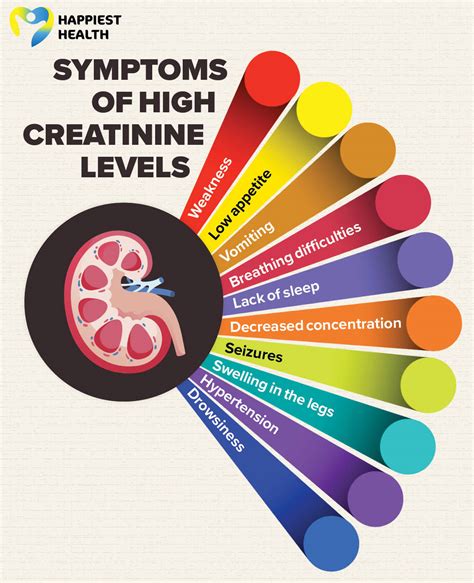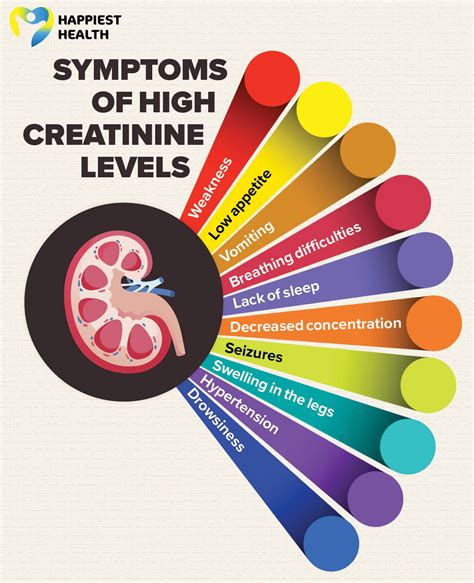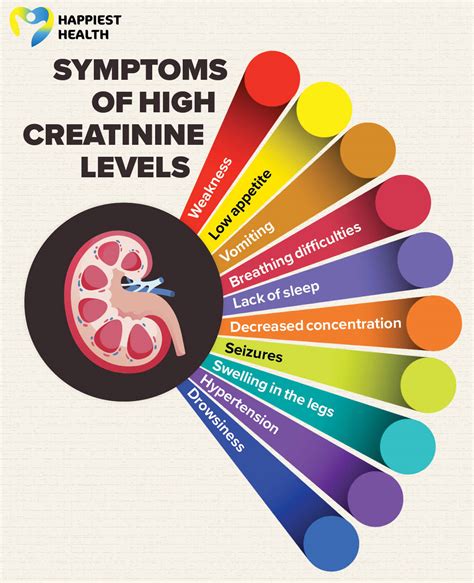Intro
Understand high creatinine bloodwork results, causes, and symptoms. Learn about kidney function, creatinine levels, and related health issues like kidney disease and renal failure.
Elevated creatinine levels in bloodwork can be a concerning finding for many individuals. Creatinine is a waste product that is produced by the normal breakdown of muscle tissue, and the kidneys are responsible for filtering it out of the blood. When creatinine levels are high, it may indicate that the kidneys are not functioning properly. In this article, we will delve into the world of high creatinine bloodwork, exploring what it means, its causes, symptoms, and treatment options.
The importance of understanding creatinine levels cannot be overstated. Kidney disease is a significant health concern, affecting millions of people worldwide. If left untreated, kidney disease can lead to serious complications, including kidney failure, heart disease, and stroke. By understanding the causes and consequences of high creatinine levels, individuals can take proactive steps to protect their kidney health and overall well-being.
High creatinine levels can be caused by a variety of factors, including kidney disease, dehydration, and certain medications. In some cases, high creatinine levels may be a sign of an underlying medical condition, such as diabetes or high blood pressure. It is essential to work with a healthcare provider to determine the underlying cause of elevated creatinine levels and develop an effective treatment plan.
What is Creatinine?

How is Creatinine Measured?
Creatinine levels are typically measured using a blood test or a urine test. The blood test measures the level of creatinine in the blood, while the urine test measures the level of creatinine in the urine. The results of these tests are then used to calculate the glomerular filtration rate (GFR), which is an estimate of kidney function. A low GFR indicates that the kidneys are not functioning properly, while a high GFR indicates that the kidneys are functioning normally.Causes of High Creatinine Levels

Symptoms of High Creatinine Levels
The symptoms of high creatinine levels can vary depending on the underlying cause. Some common symptoms include: * Fatigue * Weakness * Shortness of breath * Swelling in the feet, ankles, and hands * Nausea and vomiting * Abdominal painTreatment Options for High Creatinine Levels

Dietary Changes for High Creatinine Levels
Dietary changes can play an important role in managing high creatinine levels. Some dietary changes that may be recommended include: * Increasing fluid intake: Increasing fluid intake can help reduce creatinine levels by helping to flush out waste products. * Reducing protein intake: Reducing protein intake can help reduce creatinine levels by reducing the amount of waste products produced by the body. * Avoiding foods high in phosphorus: Foods high in phosphorus, such as dairy products and processed meats, can increase creatinine levels. * Avoiding foods high in sodium: Foods high in sodium, such as processed foods and table salt, can increase creatinine levels.Prevention of High Creatinine Levels

Monitoring Creatinine Levels
Monitoring creatinine levels is an important part of managing kidney health. Creatinine levels should be monitored regularly, especially in individuals with underlying medical conditions or those who are at risk of kidney disease. Monitoring creatinine levels can help identify any changes in kidney function and allow for prompt medical intervention.Conclusion and Next Steps

What is the normal range for creatinine levels?
+The normal range for creatinine levels is 0.6-1.2 milligrams per deciliter (mg/dL) for males and 0.5-1.1 mg/dL for females.
What are the symptoms of high creatinine levels?
+The symptoms of high creatinine levels can vary depending on the underlying cause, but common symptoms include fatigue, weakness, shortness of breath, and swelling in the feet, ankles, and hands.
How can I reduce my creatinine levels?
+Reducing creatinine levels can be achieved through a combination of lifestyle changes, such as increasing fluid intake, reducing protein intake, and avoiding foods high in phosphorus and sodium, as well as medical interventions, such as medications and dialysis.
We hope this article has provided you with a comprehensive understanding of high creatinine bloodwork. If you have any questions or concerns, please do not hesitate to comment below. Share this article with your friends and family to help spread awareness about the importance of kidney health. Remember, taking care of your kidneys is crucial for maintaining overall health and well-being.
